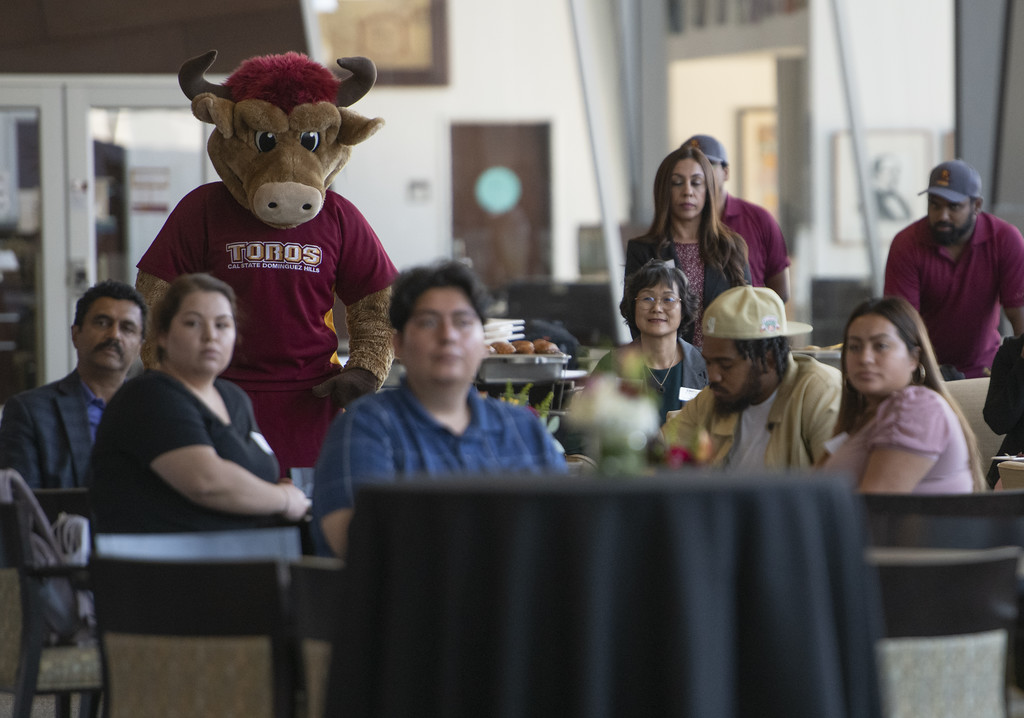CSUDH’s celebration event for returning Toros. Photo courtesy of CSUDH’s Communications and Marketing
By Maya Garibay, News Editor
Around 3500 California State University, Dominguez Hills students that had unenrolled within the last five years received a message from the Once a Toro, Always a Toro program. For the past four years, the number of returning students has remained between 128-193 until the initiative prompted a huge leap. This year 390 former Toros returned.
The program supplements the CSU Graduation Initiative 2025, which looks to double graduation rates and address equity gaps. The initiative also examines working students and low-income population students to determine how their completion rates differ.
Once a Toro, Always a Toro, reimagined the returning student process to make re-enrollment more accessible by simplifying reentry forms and procedures, waiving the application fee, and offering flexible courses and financial resources.
In Oct. 2021, CSUDH surveyed a group of previously enrolled students to understand why they left, why they haven’t returned and what the university could do to draw them back in. The Toro Reengagement Program director, Dr. Sabrina Sanders, said they found that 48% were first-generation students.
Many were proud to pursue their education and didn’t want to leave school but felt they had no other option. Some dealt with overwhelming circumstances that had driven them away from college, and others had lost their jobs, moved or just needed a break.
In terms of reapplying, many found the process overcomplicated, and others required that little push.
Kameron Swint, a human services major who initially transferred to CSUDH at the peak of COVID-19 lockdowns and restrictions in 2020, found it difficult to balance the transition while dealing with personal issues. He needed to refresh and focus on himself. Thanks to the support from this program, Swint returned last semester.
“They started reaching out and figuring out what I can do to re-enroll,” he said. “I think coming back was a smoother process than transferring just because everything was in person and there were plenty of people available to reach out to.”
Swint explains that since his reenrollment, he has been working towards becoming more familiar with the campus resources now that COVID-19 restrictions have loosened.
According to the Strada Education Network, the number one reason for pausing one’s educational endeavors was due to difficulties balancing work and school life, followed by financial pressures and other personal struggles. Sanders said that although there are several reasons students may not complete school, the pandemic’s effects saw more students drop out than ever.
She says even with the influx of returning students this year, they focus on evaluating the wins, challenges, and lessons learned to improve even more next year. In addition, they will continue to hold discussions across campus about how to make the reenrollment process more equitable and attainable. Despite that, there are still issues regarding reenrollment they are working on addressing.
“What does this mean for some of these students that walked away mid-semester and got all F’s and maybe lost their academic standing? How about these students that don’t live in the area?”
Sanders says these are the questions being asked regarding reenrollment issues that the program is working on addressing. Trying to figure out what were students’ last academic standing before they unenrolled and whether or not that will be an obstacle for them when they return is one of them.
“How do we get them their classes and advise them to complete those courses? What about the students that are executives and running their own businesses? They may not have time, Sanders explained. “Should [those students] be taking business 101 when they [already] have a ton of experience? Again, [we’re] rethinking credit for prior learning.”
The following steps for the program are to keep the momentum going, ensure there’s a centralized point of contact, review the academic policies that serve as barriers to student success, and visit the financial aid policy for those that have stepped away from college without their degrees.
The Once a Toro, Always a Toro program has allowed students ready and eager to return, to reintegrate smoothly back into their college education and hopes to do so for many more.

